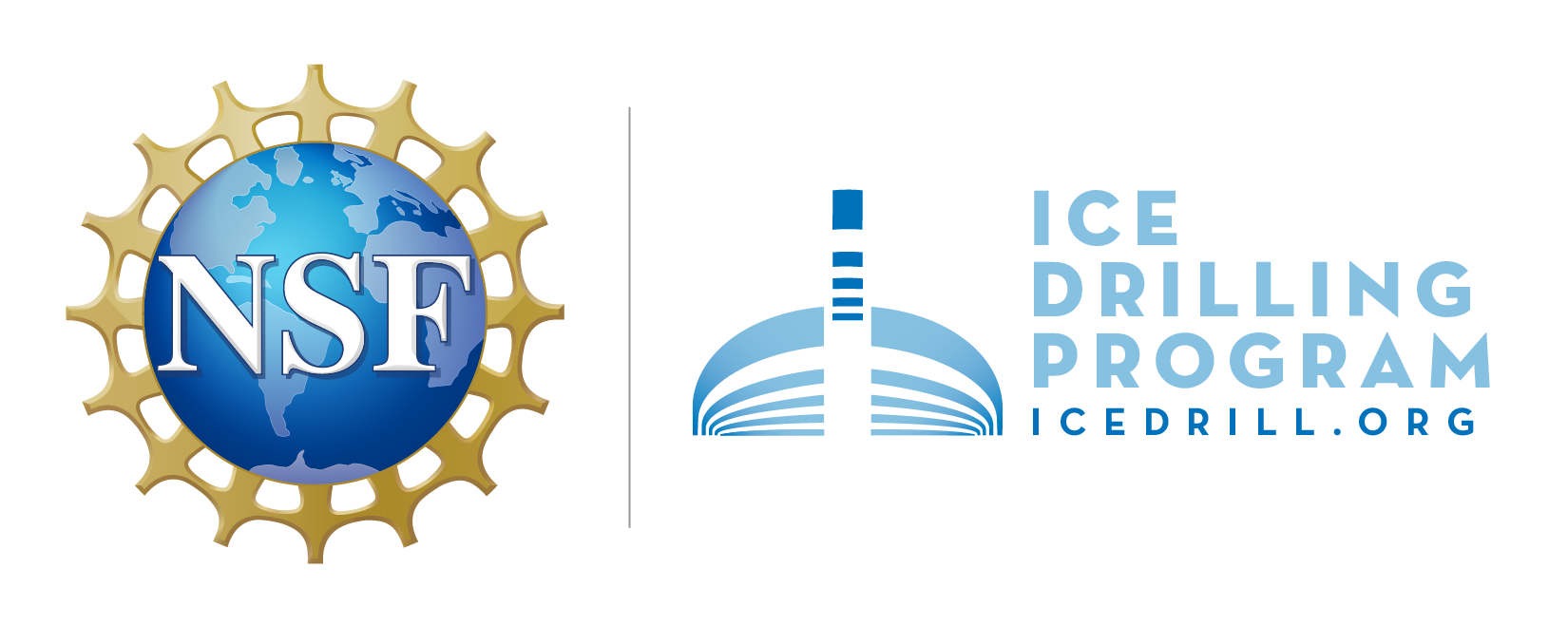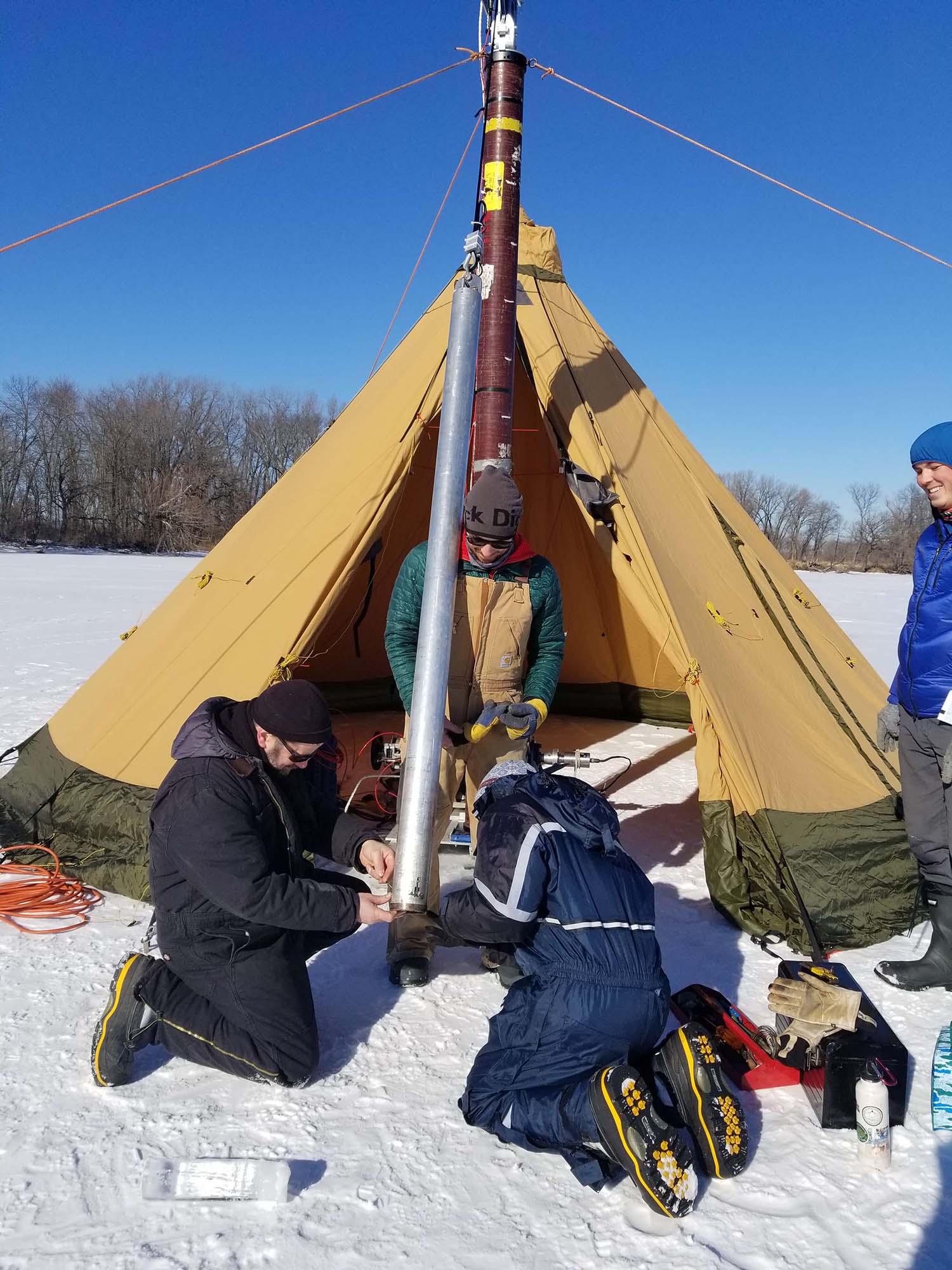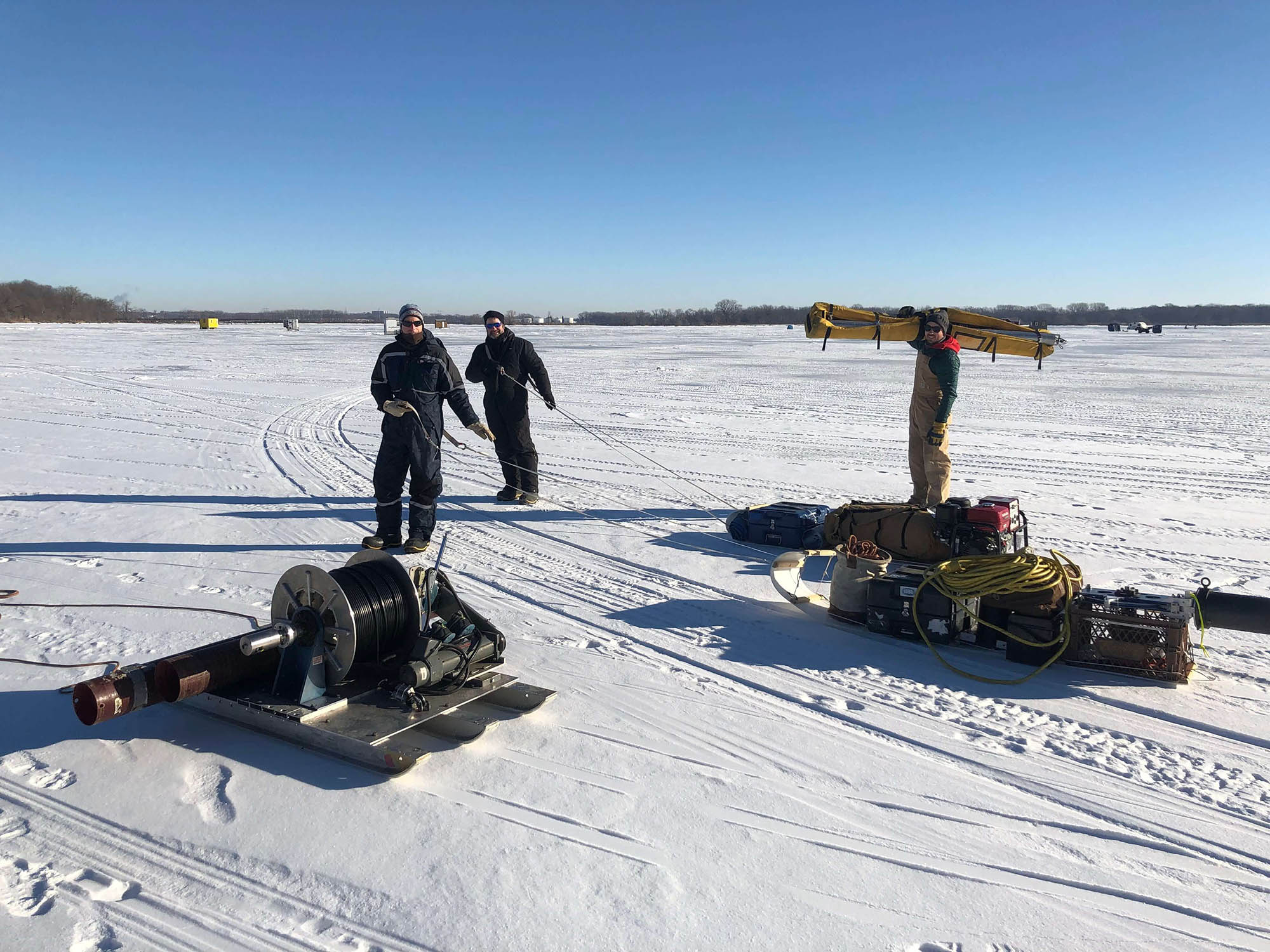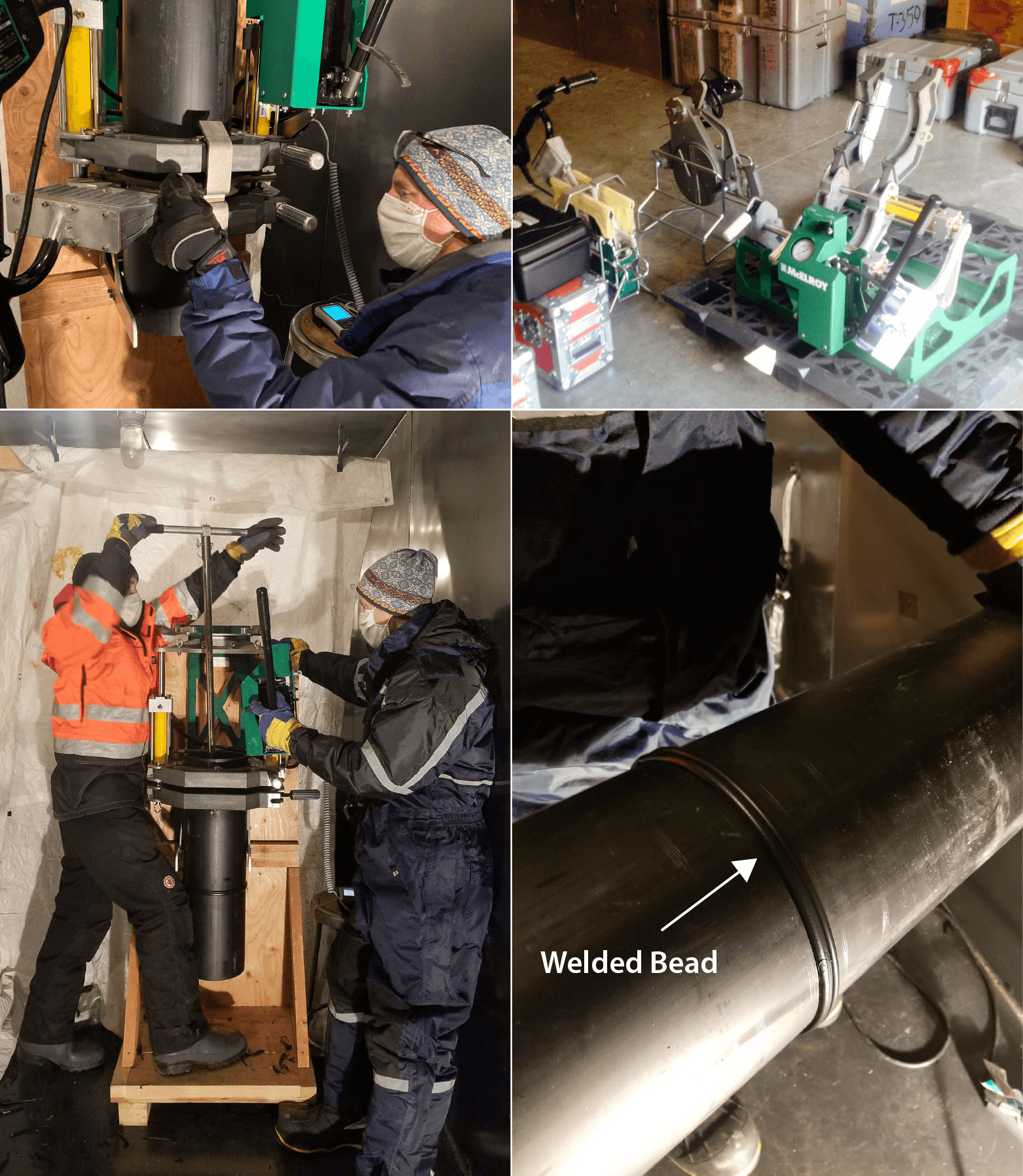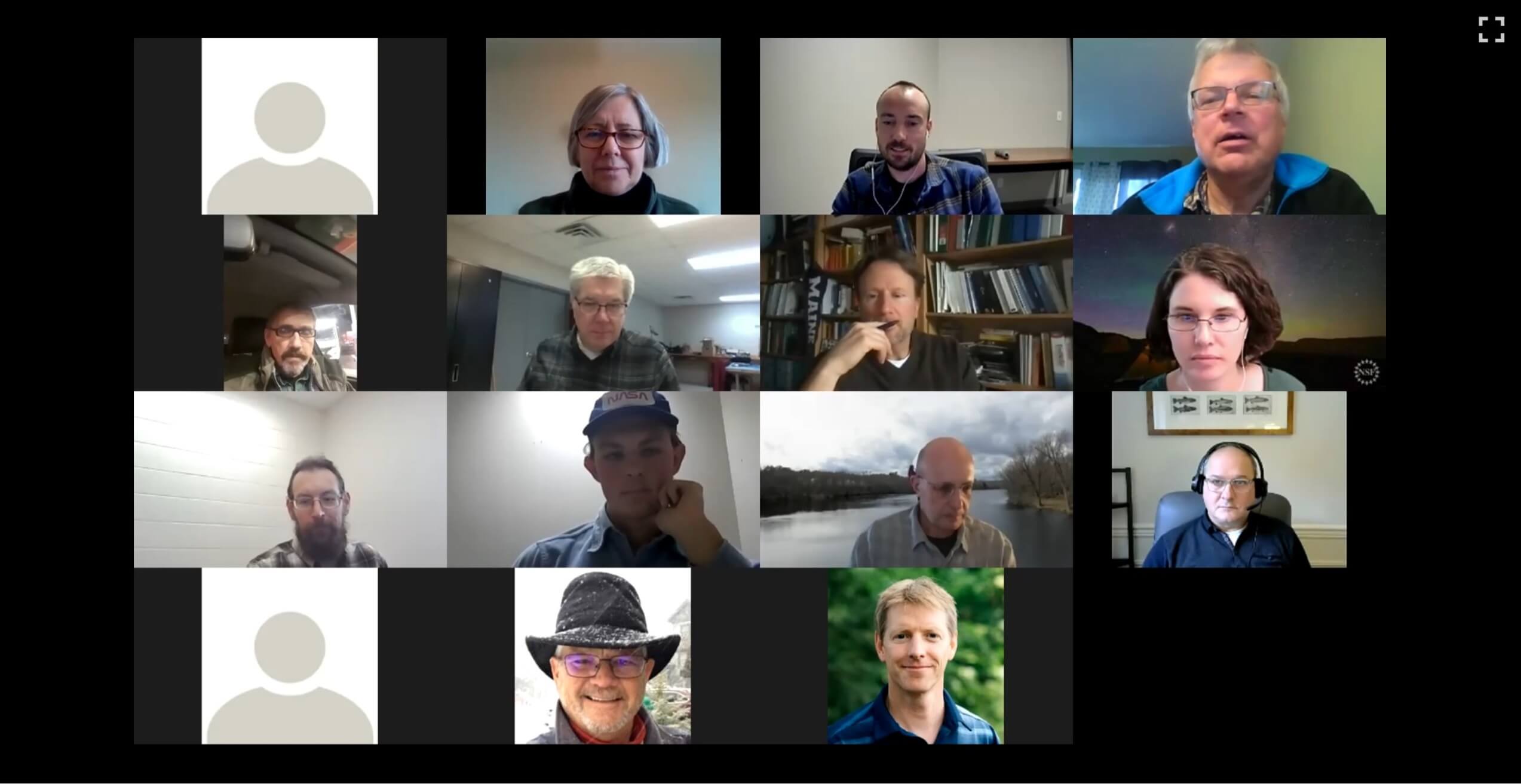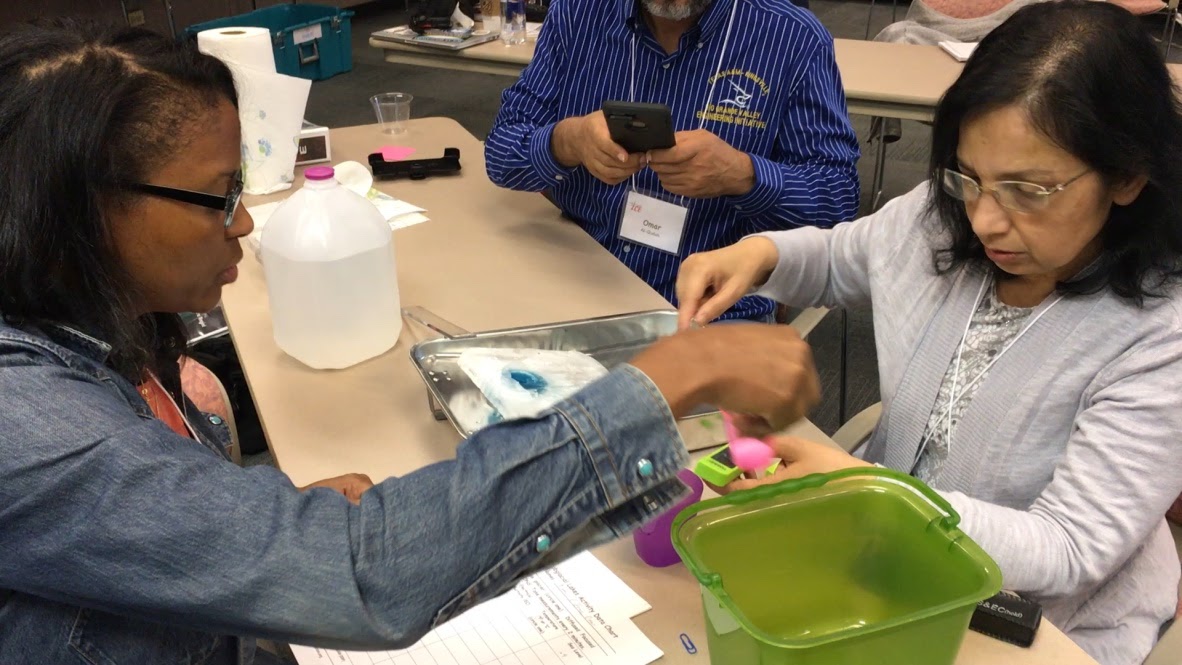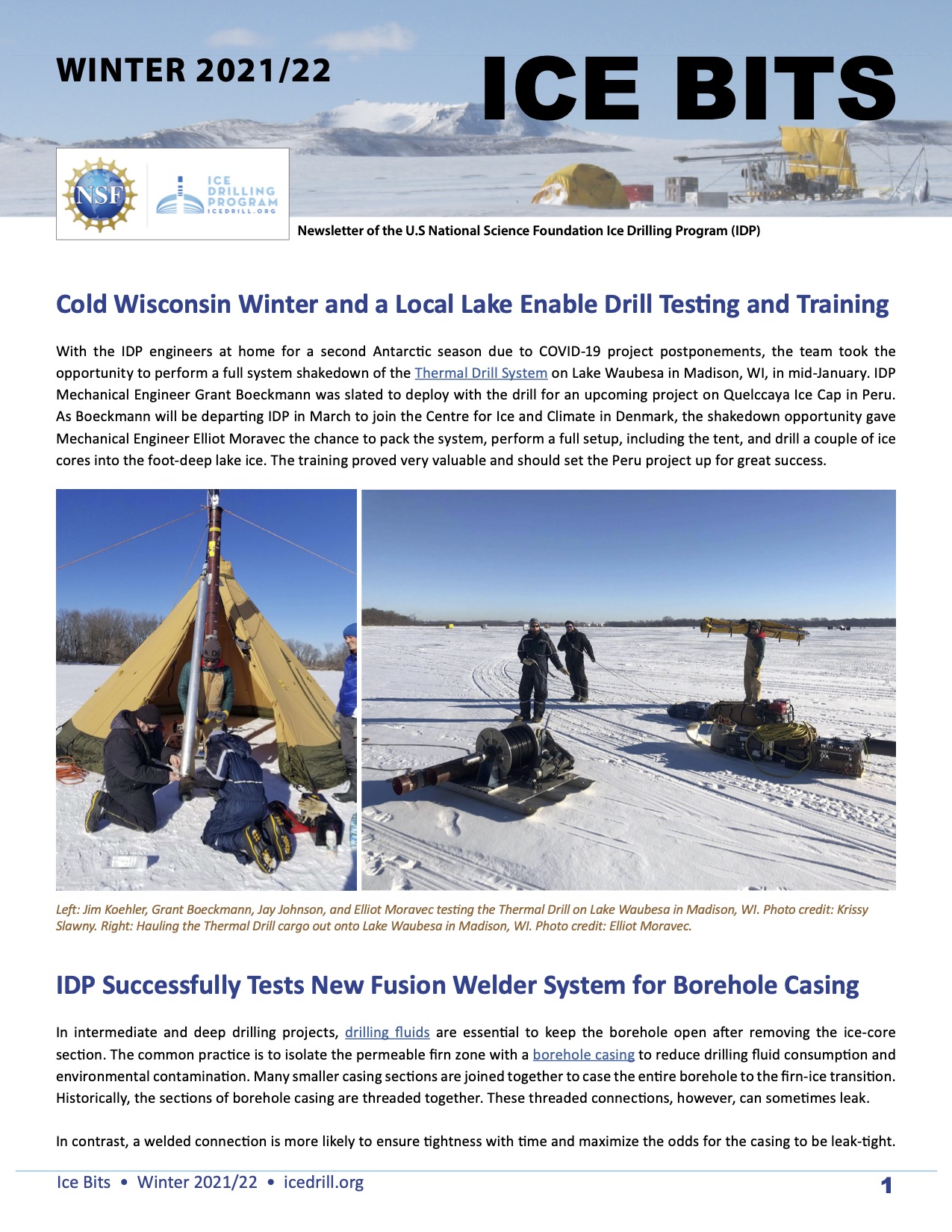Cold Wisconsin Winter and a Local Lake Enable Drill Testing and Training
- Fieldwork
- Thermal Drill
With the IDP engineers at home for a second Antarctic season due to COVID-19 project postponements, the team took the opportunity to perform a full system shakedown of the Thermal Drill System on Lake Waubesa in Madison, WI, in mid-January. IDP Mechanical Engineer Grant Boeckmann was slated to deploy with the drill for an upcoming project on Quelccaya Ice Cap in Peru. As Boeckmann will be departing IDP in March to join the Centre for Ice and Climate in Denmark, the shakedown opportunity gave Mechanical Engineer Elliot Moravec the chance to pack the system, perform a full setup, including the tent, and drill a couple of ice cores into the foot-deep lake ice. The training proved very valuable and should set the Peru project up for great success.
IDP Successfully Tests New Fusion Welder System for Borehole Casing
- Fieldwork
In intermediate and deep drilling projects, drilling fluids are essential to keep the borehole open after removing the ice-core section. The common practice is to isolate the permeable firn zone with a borehole casing to reduce drilling fluid consumption and environmental contamination. Many smaller casing sections are joined together to case the entire borehole to the firn-ice transition. Historically, the sections of borehole casing are threaded together. These threaded connections, however, can sometimes leak.
In contrast, a welded connection is more likely to ensure tightness with time and maximize the odds for the casing to be leak-tight. To this end, IDP acquired an HDPE pipe fusion welding system for welding casing pipe joints. IDP fabricated a stand to allow for the operation of the fusion welder in a vertical configuration and tested the fusion welder system in a freezer at the UW Physical Sciences Lab. The fusion welder was tested at -20°C and -40°C, and various parameters of heating time and time for joining the pipes after heating was tested. The fusion welder performed well in a vertical configuration, and the process worked well at -20°C and -40°C. IDP anticipates using the fusion welder on the borehole casing for the Hercules Dome ice core project.
700 Drill Fabrication Approved
- 700 Drill
- Long Range Plans
The IDP Science Advisory Board identified in the IDP Long Range Science Plan 2015-2025 and later, a priority need to envision and develop a drilling operation that is less logistically intensive than the existing Foro 1650 Drill (formerly referred to as the Intermediate Depth Drill or IDD), to be used to retrieve ice cores from 700 m depth at alpine or polar ice coring sites with limited logistics and with two months or less time on site. In continuing discussions, it became evident that a smaller diameter core than the Foro drills produce (e.g., 98 mm) would result in significant logistical savings.
From discussions organized by IDP with iterative discussions between scientists, and IDP staff, the 700 Drill Science Requirements were finalized, a Conceptual Design was created, a Conceptual Design Review was completed, a Detailed Design was developed, and a Detailed Design Review was completed. The proposed 700 Drill system design is guided by and meets the science requirements identified by the research community. The system will be optimized to have minimal logistical requirements for drilling projects up to 700 meters in depth. The 700 Drill will produce a 70 mm diameter core (potentially adapting to 64 mm in the future) and 88 mm diameter borehole, which will minimize the quantity (i.e., volume and weight) of drilling fluid and the number and weight of core boxes. With NSF approval, IDP is now moving forward with the construction of the drill, currently slated for completion in February 2024.
IDP Hires New Electrical Engineer and Seeks a New Field Support Manager and Mechanical Engineer(s)
- Fieldwork
On January 3, 2022, IDP welcomed Electrical Engineer Umberto Stefanini to the team. The hiring of Stefanini fills a critical need and closes a vacancy that has been open for some time. On January 14, 2022, Field Support Manager Anna Zajicek departed IDP to take a new position with Polar Field Services. Field Support duties have temporarily transitioned to Krissy Slawny until the Field Support Manager vacancy is filled. Grant Boeckmann announced he will be departing IDP in March 2022 to take a position with the Centre for Ice and Climate in Copenhagen, Denmark. IDP is interested in hiring two mechanical engineers to join the IDP team. Position Vacancy Listings for the one Field Support Manager and two Mechanical Engineer positions recently closed, and IDP is in the process of reviewing the applicants. IDP hopes for quick replacements of these key staff members to minimize any upcoming schedule disruption.
The U.S. Ice Drilling Program is made up of a team of people located at Dartmouth College, the University of New Hampshire, and the University of Wisconsin-Madison (UW-Madison). The team at the UW-Madison consists of engineers and support staff tasked with designing, building, and operating polar ice and rock coring equipment. The team at UW-Madison is small and typically doesn’t have regular vacancies but does occasionally need engineers and/or part-time equipment operators. The UW-Madison team also occasionally hires undergraduate Student Hourly employees and Research Interns (post-undergraduate graduation) to work in Madison, WI, with its engineering team. Feel free to send us your resume, and we will add you to our list of interested participants. We can be reached at IceDrill@Dartmouth.edu. When we have position vacancies, they will be posted on the IDP website at https://icedrill.org/jobs.
Announcing School of Ice - Summer 2022
- Education/ Outreach
- Meetings/ Workshops
The School of Ice is an NSF-funded professional development program for college faculty and high school teachers who teach advanced science courses. This program will train participants to understand paleoclimate evidence derived from ice cores and acquire the skills necessary to bring this exciting inquiry into new and existing Earth and environmental science classes on their campuses. The experiential nature of this workshop will build background knowledge of cutting-edge research and empower participants to communicate authentic paleoclimate research practices, ice core data, and results to their students.
There will be two opportunities to attend the School of Ice this summer. Besides thinking about the dates, please help us reduce our carbon footprint by considering the one closer to you geographically. In both, you will interact with experts currently working in climate and ice science research, take interesting field trips, and engage in hands-on learning experiences you can use with your students. Learn more at https://icedrill-education.org/school-of-ice/. Travel expenses are paid, and all resources are provided freely to workshop participants.
Registration is open now. Priority consideration will be given to applications received by the due date but accepted on a rolling basis until the workshop is filled. Note: there is usually a waiting list to attend, so apply early!
School of Ice -- Dartmouth College, Hanover, NH
Date: June 26-30, 2022
Applications Due: March 11, 2022
To Apply Visit: https://docs.google.com/forms/d/e/1FAIpQLSfRbPCNsBKU_wAXQO5ae-VyXACsNEwFaxM31xC80VBs2q3iHA/viewform
School of Ice -- COLDEX-Oregon State University, OR
Date: August 6-12, 2022
Applications Due: April 14, 2022
To Apply Visit: https://docs.google.com/forms/d/e/1FAIpQLScuKTo3Qyk0JTbXhIUzXCH11tys1CuHZmvwFkqm0f_WKhPwYQ/viewform
Save the Date - US Ice Core Open Science Meeting, May 24-26, 2022
- Meetings/ Workshops
- Long Range Plans
- Education/ Outreach
The first annual US Ice Core Open Science Meeting will be held May 24-26, 2022, at the beautiful Scripps Seaside Forum at the Scripps Institute of Oceanography in La Jolla, California. It will also be possible to attend online.
This meeting is intended for anyone interested in ice core science or related fields, including ice-core analysis, ice or subglacial drilling, glacier geophysics that supports or depends on ice core records, paleoclimate, and contemporary climate and ice sheet change. Goals of the meeting include 1) sharing of the latest science, 2) discussion of future ice core science projects in both the polar regions and in alpine environments, 3) providing career development opportunities, and 4) improving communication about ice-core and related science both within and beyond the scientific community. We hope to attract a diverse group of participants, including those who may not have extensive experience working with ice cores. While this meeting is primarily oriented toward researchers in the US, international attendees are welcome.
The meeting will begin the morning of Tuesday, May 24, and end by early afternoon Thursday, May 26, followed by the annual meeting of the US Ice Core Working Group.
Join the Hercules Dome mailing list to ensure you do not miss announcements: https://herculesdome.org/get-involved.
Deadlines:
- March 21: Please register by this date to be considered for early career financial support
- April 15: Registration deadline
- April 29: Deadline to book a hotel at the group rate
Registration:
For those attending in person, there is a $100 registration fee. There is limited financial support for early career attendees; if you wish to be considered for this support, please register by March 21. The registration deadline is April 15. The late registration fee is $200.
To register, complete the registration form at https://catalyst.uw.edu/webq/survey/steig/419153.
To pay for the registration fee, please first complete and submit the registration form, and then go to the payment portal at the University of California-Irvine.
Venue and Lodging:
The meeting will be held at the Scripps Seaside Forum at the Scripps Instituion of Oceanography, May 24-26, 2022. We have reserved a block of rooms at La Jolla Shores Hotel and the adjacent La Jolla Beach & Tennis Club, both within walking distance of the meeting. Individual attendees should make their own reservations directly with the Hotel Reservations Department at 866 976-6659. Please refer to the Antarctic Ice Core Meeting when making reservations. Rooms range from $219 Beach & Tennis Club to $239 or $289 per night at La Jolla Shores. All rooms are double occupany (that is, the per person cost is $110 to $145 per night if you share a room). Please book by April 29 to ensure you get the contract rate.
Organizing Committee:
This meeting is jointly organized by representatives and leaders of the Hercules Dome Ice Core Project, the Center for Oldest Ice Exploration, the US Ice Drilling Program, and the Juneau Icefield Research Program. The organizing committee is Eric Steig, Sarah Aarons, Seth Campbell, TJ Fudge, and Heidi Roop.
Meeting Website:
For additional information, visit the meeting website at: https://herculesdome.org/us-ice-core-open-science-meeting
Acknowledgment of IDP in Publications
- Publications
If you receive any support from IDP, we kindly request that you acknowledge IDP in any resultant publications or articles with the following statement: “We thank the U.S. Ice Drilling Program for support activities through NSF Cooperative Agreement 1836328.” If you have any questions, please contact us at IceDrill@Dartmouth.edu.
Ice Drilling Support for NSF Polar Proposals
- Funding Opportunities/ Solicitations
- Education/ Outreach
If you are preparing a National Science Foundation (NSF) proposal that includes any kind of support from IDP, you must include a Letter of Support from IDP in the proposal.
Researchers are asked to provide IDP with a detailed support request three weeks prior to the date the Letter of Support is required. Early submissions are strongly encouraged.
Scientists who seek to include IDP education and outreach activities associated with U.S. ice coring or drilling science projects should contact Louise Huffman at Louise.T.Huffman@Dartmouth.edu during their proposal preparation stage.
For further information on requesting IDP support, visit our website at https://icedrill.org/requesting-field-support or contact us at IceDrill@Dartmouth.edu.
